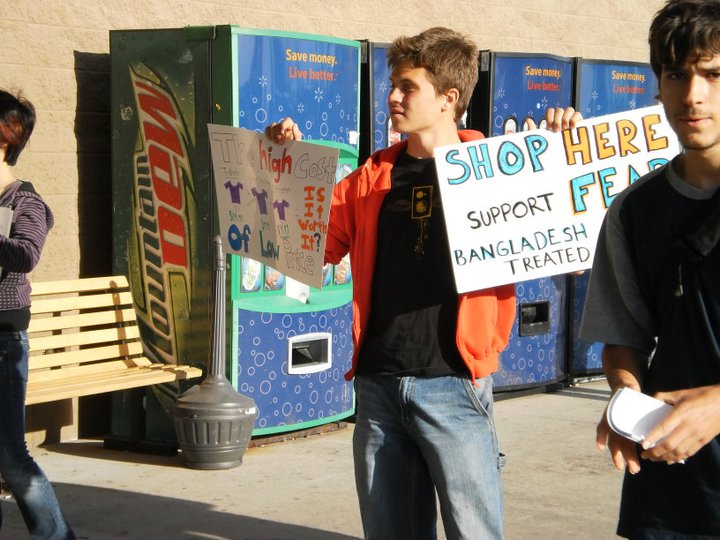
Speaking of children working in inhumane conditions, how much did he pay the 5-year-old who created that sign?
Sometimes, avoiding the first-person voice on this blog is impractical. But we try, and will continue to. Here’s a recent conversation with a Lexus-driving business owner who lives in one of the ritziest gated communities in town, if not the ritziest:
Him: You shop at Walmart? (harrumph)
Yes, he harrumphed. An onomatopoeic expression that sums up his indignation with our choice of grocery purveyor far more effectively than any words could. Our relationship will never be the same.
It doesn’t matter what the low-cost provider is. Could be WinCo, Food4Less, or whichever discounter in your town sells in bulk and doesn’t waste money on décor. But Walmart gets most of the notoriety, and will serve as our example. It’s notorious because it isn’t unionized, and was founded in a part of the country that some people equate with a punchline. Boiled down to their essence, the reasons most commonly given for not buying groceries at Walmart (and passing judgment on those who do) are:
- The people who shop there are comically unfashionable, which should make it obvious to you that the food itself is awful.
- The company exploits workers, somehow.
- It runs mom-and-pop stores out of business.
Grocery shopping is not a social statement, or at least it shouldn’t be. It’s simply something you do to avoid starvation.
Given that Walmart has the most employees of any corporation in the United States, and doesn’t keep any of them shackled, is there any chance that maybe the employees don’t feel they’re being exploited?
You could argue that they’re too dumb to know it, as many a wag does. At that point it becomes less about the principals and more about the observer.
Day-to-day buying and selling of goods and services in a relatively free economy like the United States’ is a series of voluntary exchanges. Ideally, the cheapest provider not only ought to win (in a logical sense), but should win (in a moral sense). You take possession of whatever it is you wanted regardless of whom you buy from, but when patronizing the lowest bidder you end up with more money in your pocket. You’d think this is so obvious that it doesn’t warrant mentioning, but it does. Again and again and again. In the same respect, when selling something – and what most of us sell is ourselves, on a regular schedule 5 days a week – we’re looking for the opposite and will only do business with the highest bidder.
When buying anything, and we used groceries because they’re as much of a necessity as anything, you’re welcome to pay a premium for proximity, for perceived quality, or even for guilt. But the sensible thing to do is to buy as cheaply as possible. When operating as a seller (see above), you’re again welcome to offer a discount. But you’d need a compelling reason to. Two jobs with the same requirements, equidistant from your home, but you’d choose the one that pays less? Maybe if your ex-spouse sits by the door at the better-paying one, but it’s hard to think of many other reasons why you’d refuse an opportunity to make more money with no incremental effort.
Back to the buying side. Clearly, the Cheerios and celery at Safeway are of much higher quality than those sold by the Bentonville Bruiser. And the canard about running family businesses out of operation doesn’t stand up to any kind of scrutiny. How Kroger, SuperValu, and the Delhaize Group stores (Food Lion, et al.), each multibillion-dollar concerns, managed to avoid that same accusation is a mystery. The “mom-and-pop” grocery store is, to almost all of us, laughably inapplicable and obsolete. Family-owned food merchants are as much a part of 2012’s landscape as dry goods stores and blacksmiths are.
There are trillions of ways to waste money, and future generations will find further ways that we could never conceive of. But with respect to gambling, smoking, drinking, taking out permanent life insurance, and incurring credit card debt, it’d seem that paying extra just for the sake of paying extra would be an easy one to omit. For many, it isn’t.
Speaking out of self-interest, we can make an argument that that’s good: when other people are willingly spending more than they need to, it makes it easier for the rest of us to make offers on assets. After all, there are now fewer viable bidders in the marketplace. On the other hand, a society full of financial dimwits is a weak one. There are two major reasons why China went from economic wasteland to powerhouse in barely a generation. One is a government policy of economic liberalization, the other is a cultural propensity to bargain and save. (Cf. Mark Steyn, “Culture trumps economics.” When you’ve got both on your side, seismic shifts occur.) Westerners who do dumb things with their money indirectly hurt all of us, their cumulative effects making our society that much weaker.
Maybe the economic truths that we hold to be self-evident, aren’t. Buying an item at Store X when Store Y sells it more cheaply means putting your own financial interest in a position of relative unimportance. Caring about the plight of the non-unionized Walmart employee is a job for…the non-unionized Walmart employee. Respect that, and we won’t tell you to eat your vegetables and straighten your tie.
This article is featured in:



